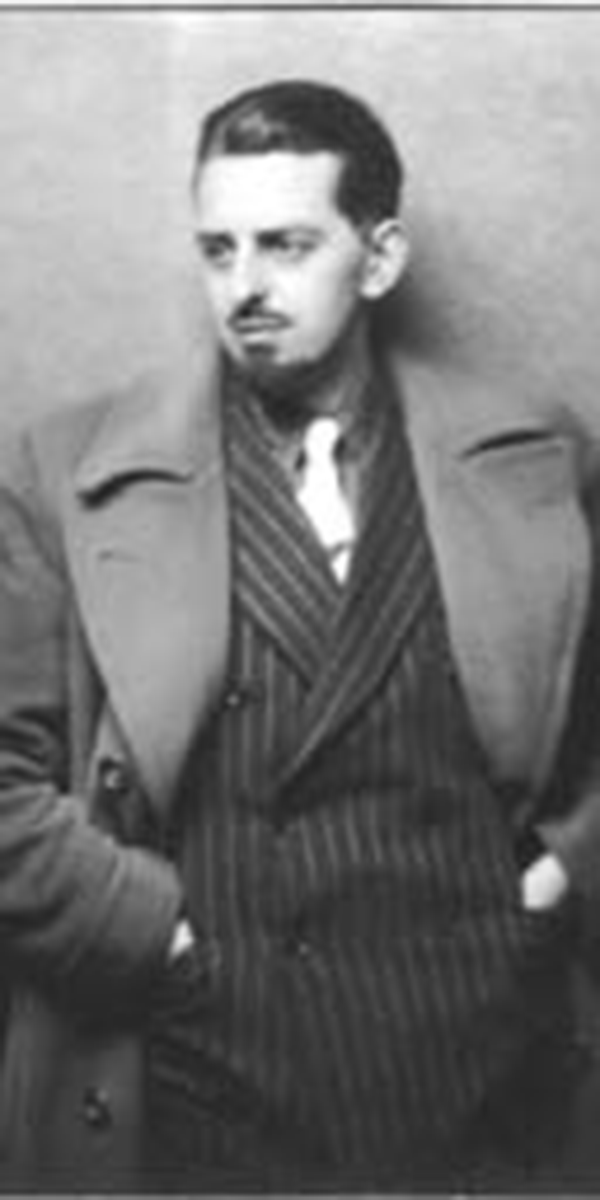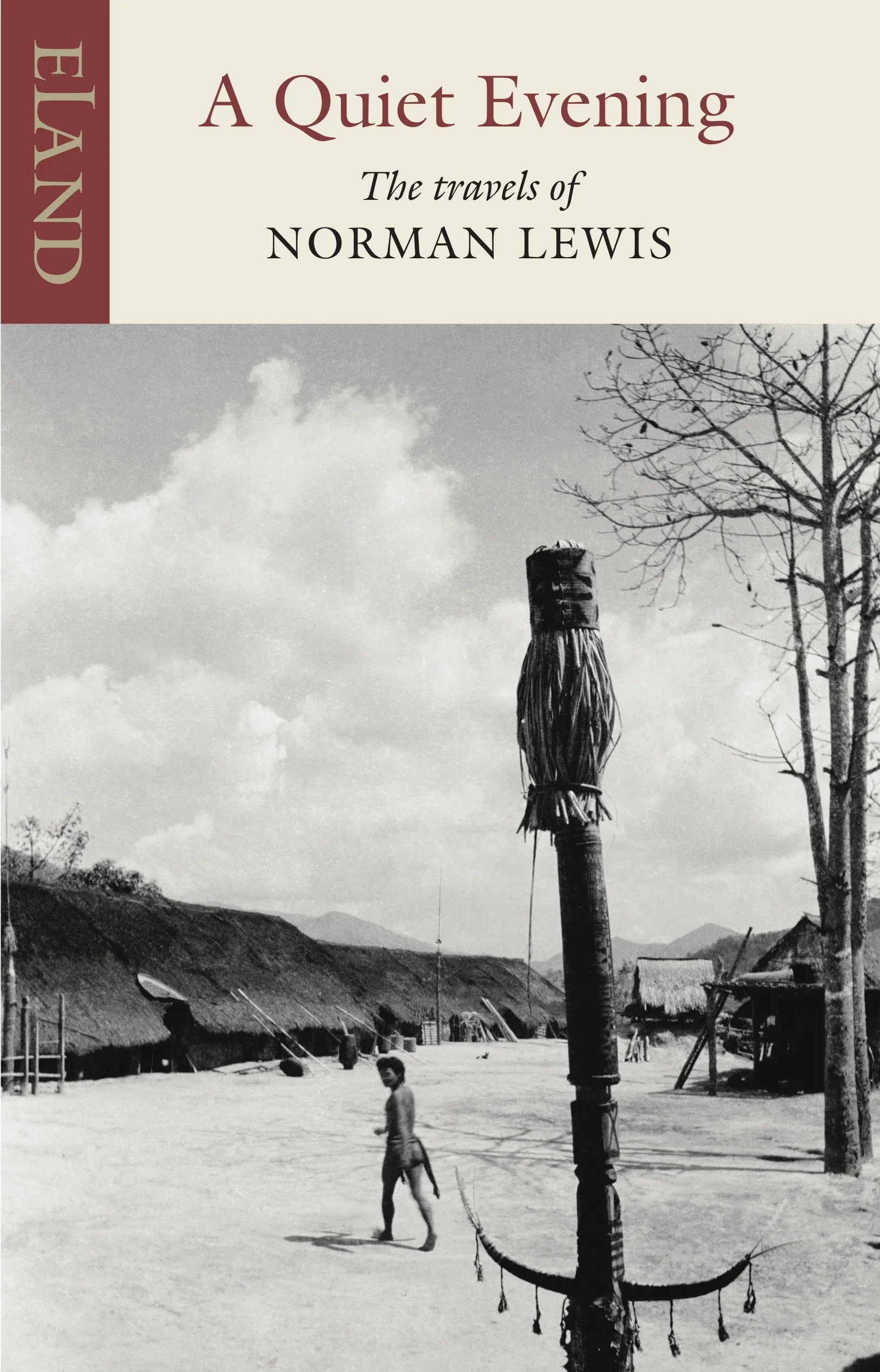NORMAN LEWIS
Norman Lewis wrote thirteen novels and thirteen works of non-fiction, mostly travel books. His early childhood, as recalled in Jackdaw Cake (1985), was spent partly with his Welsh spiritualist parents in Enfield, North London, and partly with his eccentric aunts in Wales.
Forgoing a place at university for lack of funds, he used the income from wedding photography and various petty trading to finance travels to Spain, Italy and the Balkans, before being approached by the Colonial Office to spy for them with his camera in Yemen. He moved to Cuba in 1939, but was recalled for duty in the Intelligence Corps during the Second World War. It was from this that Norman Lewis's masterpiece, Naples '44, emerged, a resurrection of his wartime diary only finally published in 1978. Before that came a number of novels and travel books, notably A Dragon Apparent (1951) and Golden Earth (1952), both of which were best sellers in their day. His novel The Volcanoes Above Us, based on personal experiences in Central America, sold six million copies in paperback in Russia and The Honoured Society (1964), a non-fiction study of the Sicilian Mafia, was serialised in six instalments by the New Yorker.
Norman Lewis wrote thirteen novels and thirteen works of non-fiction, mostly travel books, but he regarded his life's major achievement to be the reaction to an article written by him entitled Genocide in Brazil, published in The Sunday Times in 1968. This led to a change in the Brazilian law relating to the treatment of Indians, and to the formation of Survival International, the influential international organisation which campaigns for the rights of tribal peoples. He later published a very successful book called The Missionaries (1988) which is set amongst the Indians of Central and Latin America.
Articles, Stories & Other News

Can a book save one’s life? I used to think so when stationed in Mogadishu, avoiding thoughts of murder or suicide in that sunburnt madness only by immersing myself in Gerald Hanley’s Warriors (1971). Day after day I would throw myself on to my bed after another utterly fruitless, pointless day in the president’s office, and lie down, sweating beneath squadrons of flies and mosquitoes, and try to forget about it all.
George Orwell says somewhere that autobiography is to be trusted only when it reveals something dreadful. Almost any sort of life when viewed from the inside consists largely of a series of defeats.
I am probably one of the few persons to have been tipped by a taxi driver, instead of the normal reverse transaction being the case. It was a small matter, yet provided an unforgettable moment of illumination of a cultural and spiritual divide between the East, as represented by Burma, and the West.
Today Vesuvius erupted. It was the most majestic and terrible sight I have ever seen, or ever hope to see. The smoke from the crater slowly built up into a great bulging shape having all the appearance of solidity. It swelled and expanded so slowly that there was no sign of movement in the cloud which, by evening, must have risen thirty or forty feet into the sky, and measured many miles across . . .
On an early Monday evening in November Norman and Lesley made a rare trip to London together. The occasion was a birthday party at the Groucho Club for Martha Gellhorn, a few month younger than Norman. Both were now eighty-five. Lesley recalls that the dinner was "fascinating. Her coterie of young men [was there], John Simpson, Jon Snow, Nicholas Shakespeare, John Hatt. It was predominately a male occasion." Gellhorn had been asked, as had Norman, by the Daily Mail to write a piece about her best of all time travel book for its New Year's Day edition, and told him she had chosen Naples '44.
'Empire' is undoubtedly the right technical term for a mass of sea-sundered territories ruled from a single centre. When I lived in Malaysia I was aware of Sumatra a few sea miles to the west; when I was in Brunei (which on Norman Lewis's map has, with Sabah, been swallowed by Sarawak) I was to the north of an unexplored mass of jungle that belonged to Indonesia.
THEY CHANGE THEIR SKY, not their soul,' as Horace said, 'who run across the sea.' The sad old Roman truth is not to be refuted. Escape is never more than partial. Nevertheless, at a minor geographical level small, reviving evasions can be planned. This one was to Spain, an unlikely bolthole, it might be supposed, in the era of the package deal; yet far from the Costas in the deep interior rich lodes of undisturbed hispanidad remain to he discovered . . .
THEY CHANGE THEIR SKY, not their soul,' as Horace said, 'who run across the sea.' The sad old Roman truth is not to be refuted. Escape is never more than partial. Nevertheless, at a minor geographical level small, reviving evasions can be planned. This one was to Spain, an unlikely bolthole, it might be supposed, in the era of the package deal; yet far from the Costas in the deep interior rich lodes of undisturbed hispanidad remain to he discovered . . .
I chose Farol on the Costa Brava and as it turned out spent three summer seasons there, studying and writing about the life of the people. Protected by an approach down something hardly better than a can track, followed by steep gradients and hairpin bends, and a final patch of swamp crossed by a swaying bridge, the village was perfect from my point of view . . .
A Dragon Apparent and Golden Earth established Norman Lewis as a writer of uncommonly well-written prose, who, as Cyril Connolly noted, had a remarkable gift for making even a lorry seem interesting. Both books, published in impressively short succession, were lavished with superlatives from the critics of the time . . .
For many of its practitioners, travel writing is entirely a romantic venture by which the writer imagines himself as the hero of his own account, tramping his way through uncharted sands like Lawrence of Arabia. A more modest writer might see things less conceitedly and make himself the fool instead; but surely only a truly self-effacing one could resist the temptation of making himself the central character in his own travel book . . .
There were seven jars attached to the framework in the centre of the room and as soon as the chief’s sons-in-law had arrived and hung up their cross-bows on the beam over the adventures of Dick Tracy, they were sent off with bamboo containers to the nearest ditch for water . . .
The writer Norman Lewis, who has died aged 95, once claimed to be the only person he knew who could walk into a room full of people, and leave it some time afterwards without anyone else realising that he had been there. That there was only limited truth in the assertion was unimportant; it says far more about his modesty that failing to attract attention was the only claim he pretended to . . .
This is a biography by someone who dislikes biography about someone who disliked exposure,' declares Julian Evans in his preface, adding that he wrote this book only to stop anyone else doing so . . .
Norman Lewis has spent a lifetime travelling the world and writing about it. In conversation with Michael Parkinson, he recalls his curious upbringing in Wales with three maiden aunts, his travels in Cuba where he met Ernest Hemingway, and his love of Naples which led to his writing two books on the Mafia. He also chooses the eight records he would take to the mythical island . . .
Neapolitans take their sex lives very seriously indeed. A woman called Lola, whom I met at the dinner-party given by Signora Gentile, arrived at HQ with some denunciation which went into the waste-paper basket as soon as her back was turned. She then asked if I could help her. It turned out she had taken a lover who is a captain in the RASC, but as he speaks no single word of Italian, communication can only be carried on by signs, and this gives rise to misunderstanding . . .
Norman Lewis’s life was as significant in historical terms as it was colourful. As a witness to his times – the good, the bad and the absurd – he was unmatched; his instinct for important events was practically infallible. Among 20th-century writers, only Norman can tell you first-hand about being on the receiving end of the Asturian miners’ gunfire that preceded the Spanish Civil War and about the resistance of the East Timorese to President Suharto’s soldiers sixty years later . . .

“Norman Lewis is one of the best writers, not of any particular decade, but of our century.”
-
Norman Lewis: The Time Traveller (1993). Lewis goes to the Baliem Valley of Irian Jaya, New Guinea, to observe the… https://t.co/NNYwRo7Sju
































